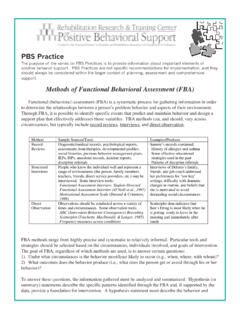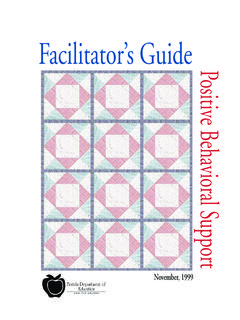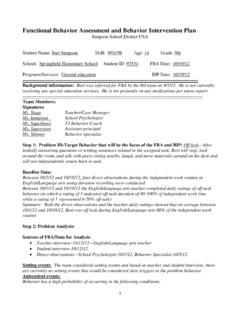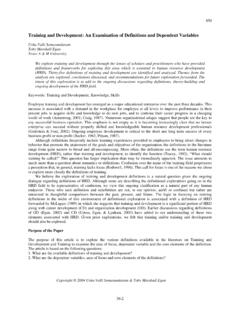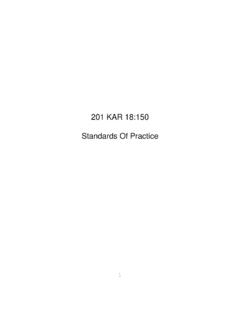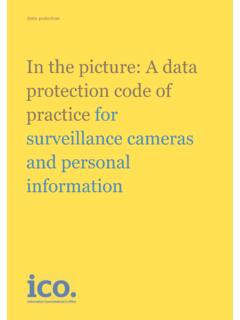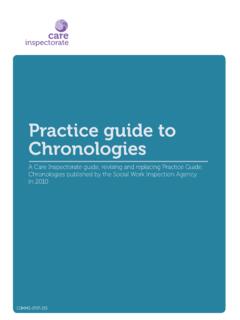Transcription of PBS STANDARDS OF PRACTIC: INDIVIDUAL LEVEL
1 1 The Association for Positive Behavior Support (APBS) Positive Behavior Support STANDARDS of Practice: INDIVIDUAL LEVEL Iteration 1 Approved by The APBS Board of Directors: March, 2007 For More Information About APBS, Please Visit: 2 Table of Contents Background and Process .. 3 APBS STANDARDS of Practice Committee .. 4 I. Foundations of 5 II. Collaboration and Team Building .. 7 III. Basic Principles of Behavior .. 7 IV. Data-Based Decision-Making .. 9 V. Comprehensive Person Centered and Functional Behavior 10 VI. Development and Implementation of Comprehensive, Multi-element Behavior Support Plans .. 12 3 APBS STANDARDS of Practice: INDIVIDUAL LEVEL Iteration 2 Background and Process In 2005, the Association for Positive Behavior Support (APBS) board made the decision to develop STANDARDS of practice for positive behavior support (PBS).
2 The board recognized the need for STANDARDS of practice given the widespread use of PBS, the multiple disciplines that utilize PBS procedures, and the various theoretical perspectives that professionals bring to their respective PBS practices. Drs. Jacki Anderson, Fredda Brown, and Brenda Scheuermann were assigned as co-chairs of a new committee to organize and coordinate the process of developing and drafting the STANDARDS of practice document. As part of this process, a request to participate in various aspects of the development process was sent to the APBS membership. Numerous responses were received with a few individuals agreeing to invest substantial time in the committee's activities. The committee identified and reviewed published recommendations for PBS practice, reviewed STANDARDS from state- LEVEL PBS training programs ( Kansas and Florida), and developed an initial draft of STANDARDS of practice for PBS.
3 The consensus that emerged after many lengthy discussions was that this first STANDARDS of practice document should focus exclusively on INDIVIDUAL - LEVEL PBS practices. The committee collected feedback and continued to refine the document over a two year time frame. A draft of the STANDARDS of practice document was presented in an open session at the 2006 APBS conference. Recommendations from participants in that session were incorporated and further refined to ensure consistency in wording and format. Each generation of the STANDARDS of practice document was reviewed by the APBS board in tandem with the working committee. This document became titled the STANDARDS of Practice - INDIVIDUAL LEVEL - Iteration I. The APBS board approved the final version at their meeting at the Boston APBS conference in March 2007.
4 As stated in the introductory paragraph of STANDARDS of Practice - INDIVIDUAL LEVEL - Iteration I, this document is but a first step in articulating STANDARDS of practice that reflect the comprehensive scope and the unique aspects of PBS. Even though STANDARDS of Practice - INDIVIDUAL LEVEL - Iteration I is a work in progress, the goal is to disseminate the STANDARDS as they currently exist and to periodically disseminate each iteration as it is created. This document was developed through a collaborative effort of many individuals who have committed themselves to research and development of PBS over many years. To date, no validation data exist, however the face validity of the document appears strong. APBS is confident that the STANDARDS of Practice - INDIVIDUAL LEVEL - Iteration I will be of value and support in a variety of professional and personal activities, including but not limited to.
5 Encouraging dialogue about PBS within the field Encouraging dialogue about PBS with professionals of different philosophical orientations Development of ABA and PBS course competencies in higher education Development of ABA and PBS course competencies for professional development Guidelines (for professionals and families) for evaluating the quality of the assessment and program development process provided for any given INDIVIDUAL Guidelines (for professionals and families) for evaluating the quality of the supports provided for any given INDIVIDUAL Guidelines (for professionals and families) for evaluating the quality of the outcome and associated processes of positive behavior support 4 Guidelines (for professionals and families) for evaluating the competence of PBS experts/consultants Guidelines for selection of university or in-service training programs Guidelines for individuals considering careers as advocates or consultants in the area of PBS Guidelines for schools, districts, or agencies for developing job descriptions for special education teachers, PBS intervention specialists or behavior specialists Guidelines for grant evaluators to assess quality of proposed training/intervention programs for INDIVIDUAL - LEVEL supports Guidelines for policy makers relevant to the provision of behavior support in schools, homes and communities APBS STANDARDS of Practice Committee.
6 Jacki Anderson, co-chair Fredda Brown, co-chair Brenda Scheuermann, co-chair Candy Baker Randy DePry Charles Dukes Jennifer McFarland Meme Hieneman Steve Kroeger Sharon Lohrman Christopher Oliva Chris Reeve Carol Schall In addition, the following APBS members provided feedback and comments that helped guide the development of the STANDARDS of Practice - INDIVIDUAL LEVEL - Iteration I: Linda Bambara Ted Carr Rob Horner APBS Board Members at time of approval of APBS STANDARDS of Practice - INDIVIDUAL LEVEL - Iteration I: Glen Dunlap, President Jennifer Zarcone, Vice-President Cindy Anderson, Treasurer Rachel Freeman, Secretary Tim Knoster, Executive Director Jacki Anderson Linda Bambara Fredda Brown Randall DePry Lucille Eber Don Kincaid Tim Lewis Bobbie Vaughn 5 Association for Positive Behavior Support (APBS) Positive Behavior Support STANDARDS of Practice: INDIVIDUAL LEVEL Iteration I February, 2007 This document is a collaborative effort of the membership and the Board of the Association for Positive Behavior Supports (APBS).
7 It is a work in progress with the intent of identifying those concepts and methods essential to the implementation of positive behavior supports (PBS) on the INDIVIDUAL LEVEL that is, with individuals who engage in problem behavior. This document includes many items that reflect the foundations of Applied Behavior Analysis (ABA), although it is certainly not comprehensive in this regard. We feel inclusion of these items is important, as ABA is an integral part of PBS. But it also includes additional concepts and methods that will help us further define the uniqueness of PBS. We expect this document to evolve, and for us to continue to better identify and share the essence of PBS. Areas for further development and articulation in future iterations of this document include (but are not limited to): person-centered decision-making, quality of life outcomes, the commitment to constructive and socially acceptable strategies, and incorporation of concepts and methods derived from a variety of sciences and disciplines ( , organizational management, ecological psychology, biomedical science).
8 Please consider these thoughts as you review Iteration I of the APBS STANDARDS of Practice: INDIVIDUAL LEVEL . I. Foundations of PBS A. Practitioners of PBS have an historical perspective on the evolution of PBS and its relationship to applied behavior analysis (ABA) and movements in the disability field 1. History of applied behavior analysis and the relationship to PBS 2. Similarities and unique features of PBS and ABA 3. Movements in the field of serving persons with disabilities that influenced the emergence of PBS practices a. Deinstitutionalization b. Normalization and social role valorization c. Community participation d. Supported employment e. Least restrictive environment and inclusive schooling f. Self-determination B. Practitioners applying PBS with individuals adhere to a number of basic assumptions about behavior 1.
9 Problem behavior serves a function 2. Positive strategies are effective in addressing the most challenging behavior 3. When positive behavior intervention strategies fail, additional functional assessment strategies are required to develop more effective PBS strategies 4. Features of the environmental context affect behavior 5. Reduction of problem behavior is an important, but not the sole, outcome of successful intervention effective PBS results in improvements in quality of life, acquisition of valued skills, and access to valued activities 6 C. Practitioners applying PBS with individuals include at least 11 key elements in the development of PBS supports 1. Collaborative team-based decision-making 2. Person-centered decision-making 3. Self-determination 4.
10 Functional assessment of behavior and functionally-derived interventions 5. Identification of outcomes that enhance quality of life and are valued by the INDIVIDUAL , their families and the community 6. Strategies that are acceptable in inclusive community settings 7. Strategies that teach useful and valued skills 8. Strategies that are evidence-based, and socially and empirically valid to achieve desired outcomes that are at least as effective and efficient as the problem behavior 9. Techniques that do not cause pain or humiliation or deprive the INDIVIDUAL of basic needs 10. Constructive and respectful multi-component intervention plans that emphasize antecedent interventions, instruction in prosocial behaviors, and environmental modification 11. On-going measurement of impact D.
